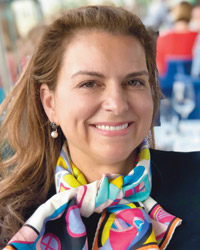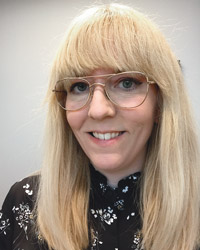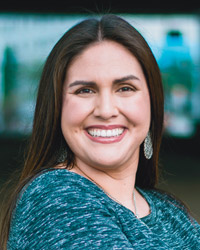Perspectives in Courage
Three women share their stories about the courage it takes to be a leader
October/November 2019Joanne B. Ciulla, Ph.D., author, professor emerita and one of the founding faculty members of the Jepson School at the University of Richmond, stated: “Leadership is not a person or a position. It is a complex moral relationship between people based on trust, obligation, commitment, emotion and a shared vision of the good.”
The Actuary reached out to several women at varying stages in their careers to provide perspectives on the courage involved with leadership. Within the three vignettes in this feature, the authors focus on life experiences unique to them:
- Cynthia Meyn reflects on her recent career shift to an insurance company.
- Sarah Maune, FSA, CFA, EA, talks about her involvement in building a women’s support network at her company.
- Muriel Holmquist shares her journey of immigrating to the United States at a young age and her current pursuit of an actuarial career.
While each story is distinct, they all share the common themes of courage, connection, trust and empathy that they have developed with others, as well as cultivated within themselves.
Thinking Won’t Overcome Fear—Action Will
By Cynthia Meyn
 Action conquers fear. I often rely on this maxim when I find myself facing change. Whether intimidated by the unknown, stymied by indecisiveness, sideswiped by an unwarranted challenge or in the midst of a crisis, I write down what is troubling me, look on the bright side and face the issues head on.
Action conquers fear. I often rely on this maxim when I find myself facing change. Whether intimidated by the unknown, stymied by indecisiveness, sideswiped by an unwarranted challenge or in the midst of a crisis, I write down what is troubling me, look on the bright side and face the issues head on.
In January 2018, as Venerable was being established, I was brought in to serve as the chief operating officer at the holding company level. I was not nervous at all, but perhaps I should have been. With 34 years of experience, I possessed a successful executive track record of leading operations, technology and risk management teams across the financial services industry. But I had never previously worked for an insurance company, and I’m not an actuary.
I was—and still am—excited about Venerable’s mission. We are a solution provider for legacy blocks of variable annuity polices. We grow through reinsurance treaties and whole-entity acquisitions, and we apply an expert hedging process to guarantee our liabilities.
Feeling confident of my abilities, I fearlessly accepted the role and walked across the metaphorical bridge to my future. But on day one, trepidation struck me—relative to everyone else’s expertise with insurance, I was a clueless person in a very senior role. I sat quietly and froze for a day. Then, leaning on my go-to thought, I reflected on what was so scary, and I took action.
First, I worried I wouldn’t “match up” with my colleagues, given my scant knowledge about the liability side of our balance sheet. But they helped me make a list of gaps, and I studied up—I read white papers about contingent tail expectation, listened to our chief risk officer explain our hedge effectiveness metrics, learned about our annual assumption updates and even watched YouTube classes covering actuarial science.
Second, I worried I wouldn’t be able to add value. Conquering that doubt, I asked others around me where they thought I could help. I was able to dive in and lead our teams through several large projects: our general ledger software selection, an asset accounting system conversion, negotiation of floor space leases, a trade floor deployment for our derivative hedges and market data procurement, among others.
Most prominently, I wrote down a fear that might resonate with anyone changing jobs. I worried I would be rejected like the new kid in school who cannot speak the local language. So, I got out of my chair and worked to forge genuine friendships at Venerable—true friendships that will endure for years. Through my new friends, many of whom are very senior leaders, I learned the most important lesson of all. We all bring different skills to the table; I am not the only person who feels different; and, together, we form a great team.
I got lucky. Because I was so unfamiliar with liability management, I was forced to step back and let others lead. It was actually very beneficial that I was quiet that first day. My role as a leader at Venerable has become one of listening, participating in a consensus decision and cooperating with a team effort. I feel very fortunate to have had such a great learning experience both practically and interpersonally.
In closing, I’ll share a short vignette. In penning these reflective thoughts, I finally researched the origin of my go-to belief. When I learned it was Clement Stone, the businessman and philanthropist who opened his own insurance company at the age of 18, employed more than 1,000 agents within 12 years and ultimately co-founded Aon, who had stated, “Thinking will not overcome fear but action will,” I felt like the planets had aligned.
Creating a Women’s Leadership Support Network
By Sarah Maune
 Why start a women’s network? Indeed, how is one started? What topics should be discussed?
Why start a women’s network? Indeed, how is one started? What topics should be discussed?
These questions came up for the women in my department at Reinsurance Group of America (RGA) in early 2018. At the time, several senior women were retiring, causing the existing dearth of females in leadership positions in our department to become even more pronounced.
I also had just taken on a leadership position right around then. I felt I was experiencing the onset of “impostor syndrome,” which meant I was doubting my accomplishments and capabilities. Finding a support system and broadening my network was at the forefront of my mind.
A woman in our department reached out to some female colleagues, including me, about the idea of starting a leadership support group for the department’s women. We quickly jumped at the opportunity and began to work on forming what we today call our “Lean-in Circle.”
Getting Started
To create our group, we knew we would need support from our department’s leadership. This would ensure that members of the group would be encouraged to spend time on it and contribute to it, and it also would allow us to ask for a small budget for webcasts and materials.
We put together a brief proposal, making sure to describe what our group was, why we were forming it and whom we would include. The “why” was the most important element, because we knew if we could make a strong business case for the group, we were more likely to get support. To do this, we tied our proposal back to talent management and culture, which we knew were important for the department.
After receiving approval and enthusiastic support, we embarked on our journey. Our group utilizes the framework and resources provided by LeanIn.Org, a nonprofit organization founded by Sheryl Sandberg in 2013 after the release of her book, Lean In: Women, Work, and the Will to Lead. The organization’s website contains a wealth of knowledge, articles and a set of invaluable meeting guides for many topics, which provided us with an easy way to get started and customize our meetings to our needs.
Topics
Since our group’s launch, we have hosted meetings on topics such as “power and influence” and “communicating with confidence.” While these meetings were effective and impactful, we wanted to pull in additional resources. This led to our hosting of a session with a panel of senior female leaders across several RGA departments to discuss their journey into leadership and hear their advice and guidance. For that meeting, we also invited associates from several departments outside of our own.
This panel discussion gave us a valuable opportunity to hear viewpoints from outside of our department and learn about the paths women leaders have taken throughout their careers. For me, it yielded several important insights and takeaways, which centered on coping with and ultimately overcoming imposter syndrome. The main concept that resonated with me was not letting “perfect be the enemy of good.” To me, this means get done what needs to get done without worrying whether it has been done perfectly. Doing something well is better than not doing anything because it’s not great.
RGA’s human resource department was an additional resource for content for our group, and it enabled the planning and execution of one of my favorite sessions to date. The session, inspired by StrengthsFinder, is based upon the book StrengthsFinder 2.0 by Tom Rath. This book, which helps people assess and uncover their own strengths and talents, includes an assessment test that helps users determine their top five talents and provides information on how to apply them to day-to-day work. We purchased the book for each session participant.
The available tools helped session participants share our strengths, discover more about ourselves and each other, and gave us space to identify strategies to utilize those strengths. So often people work on improving weaknesses. However, leaning into your strengths and improving what you are already naturally good at can lead to extraordinary results. It can also lead to greater happiness, because doing what you likely already enjoy is a strength.
We plan on utilizing the information the exercises elicited about our strengths in future sessions, to explore what else we can do to amplify these strengths even more.
Outcomes
Our group has been a true success: Communication in the department has improved, and participants report higher levels of confidence in their day-to-day activities.
I learned two main things in developing effective sessions for our group:
- Include more group members in the planning process. It is helpful to hear from other voices.
- Delegate tasks to group members in order to facilitate the plans. The structure of the group provides a safe environment for each member to practice leadership skills.
We also have found it is imperative to find ways to keep the group’s momentum going. So, we have regular monthly meetings, which keep us focused and looking forward to what’s next.
Our women’s leadership group has been a great success. The forum has enabled us to connect with colleagues throughout our company and build an encouraging, supportive environment for discovery and growth.
Courage and Leadership From an Actuarial Student Perspective
By Muriel Holmquist
 My story is both unique and common. While the details of my journey are specific to me, the purpose and nature of my story are shared by millions. I immigrated to the United States from Peru at the age of 5. While 5 seems very young, I was acutely aware of the risk we were taking. I never chose my path, but navigating a whole new world, a new language and finding a place for myself in this foreign society as a child profoundly changed the way I approach life and its opportunities.
My story is both unique and common. While the details of my journey are specific to me, the purpose and nature of my story are shared by millions. I immigrated to the United States from Peru at the age of 5. While 5 seems very young, I was acutely aware of the risk we were taking. I never chose my path, but navigating a whole new world, a new language and finding a place for myself in this foreign society as a child profoundly changed the way I approach life and its opportunities.
There have been many times when life seemed to be fighting against me. While I could have let the trials and tribulations bury me, I decided to push back and take life’s challenges as opportunities to develop both intellectually and emotionally. What I am learning about this career, the actuarial process and life in general, is that it is not about success or failure. Life is about having the guts to do the thing that frightens you the most and not only accepting, but fully appreciating, our adversities as opportunities that can perpetuate exponential growth and learning.
Atticus Finch, the protagonist in Harper Lee’s To Kill a Mockingbird, defines courage as mental, emotional and psychological fortitude, or more specifically as, “know[ing] you’re licked before you begin … [and] see[ing] it through no matter what.”1 He understood that courage is not an outward display of physical strength. Instead, true courage is risking the guarantee of comfort for the chance to attempt to do what is challenging and extraordinary.
During my entire collegiate career, I was riddled with anxiety, because despite my determination, there was never a guarantee my meticulous life plan would come to fruition. I remember as I was graduating with my master’s degree in education, an achievement I have wanted since I can remember, I was scared to death. I was petrified because I knew with all my heart that as much as I wished I could love teaching, I did not.
The harder I tried, the more evident it became that the career path to be an educator did not suit me. I was devastated. I had completely convinced myself there was only one path, only one way to achieve success, which hinged solely on an organized plan of action. I felt as though I let my loved ones down, and I did not know how I was going to find a career that was both intellectually fulfilling and realistically attainable.
During this period of my life, the actuarial field crossed my path. I specifically remember reading a CNN Business article, titled “The Best Job You Never Thought of,” by Annalyn Kurtz, and finding it very comprehensive and convincing for someone considering a new profession. I had heard about actuarial science before, but for one reason or another never seriously considered it as a viable career path.
After I read this article, I did what I usually do when a topic sparks my interest: I Googled it! The more I learned about the profession, the more interested I became. Before I knew it, an idea had sparked: What if I studied for the first actuarial exam? Sure, there were many reasons in my head as to why I would not succeed. I did not have an actuarial science degree; I had limited computer language skills; I did not have nor would I get the opportunity for an actuarial internship; and I would be risking time, effort and financial resources on an idea that was supported more by intuition than logic. With all that being said, I had one advantage. I had ganas.
In Spanish, ganas means desire. While this is the traditional denotation of the word, to me, tener ganas means having the guts to risk success for failure in order to do what both frightens and enlightens us. It means even when we know the odds are stacked against us, we decide to jump and fully endure life’s adversities for the slightest chance of attaining our dream.
Just like the risk of immigrating to the United States more than 20 years ago had paid off, I knew taking this leap of faith would come with gifts beyond my imagination—even if it tested both my strength and my determination. So, I did it. I cannonballed into the actuarial field, and I dedicated my time and effort to studying actuarial science. I did not know if this would work. I had no guarantees; just a gut feeling that I had to try.
The moment I knew actuarial science was truly my passion was the first time I attempted Exam P. After so many late nights, strong coffee and frustration, I walked out of the room knowing it was the first time I had completely failed an examination. This was it. This was the true test to see whether my instinct was right or not. I cried the whole car ride home. When I arrived home, I took a nap, woke up, made myself a tall and deliciously strong cup of coffee and instinctively started studying again. The thought of quitting never once crossed my mind.
Failing this exam was not part of the plan, but I knew I could frame the situation in a couple of different ways. I could look at the result as an indication of my success or failure as an actuary, or I could take it as a gift that proved to me that this was something I truly wanted. Without mental and emotional strength, I would not have been able to perceive this as the latter. My courage had nothing to do with success and everything to do with the moment I decided to take that risk, reach for that chance and throw away the plan. In other words, life is not linear; it is a beautiful oscillating function that acts erratically. We cannot control it, but we can decide to not let fear dictate our actions and thoughts, and courageously choose the unexpected.
References:
- 1. Lee, Harper. 1982. To Kill a Mockingbird, 115. New York: Warner Books. ↩
Copyright © 2019 by the Society of Actuaries, Chicago, Illinois.

